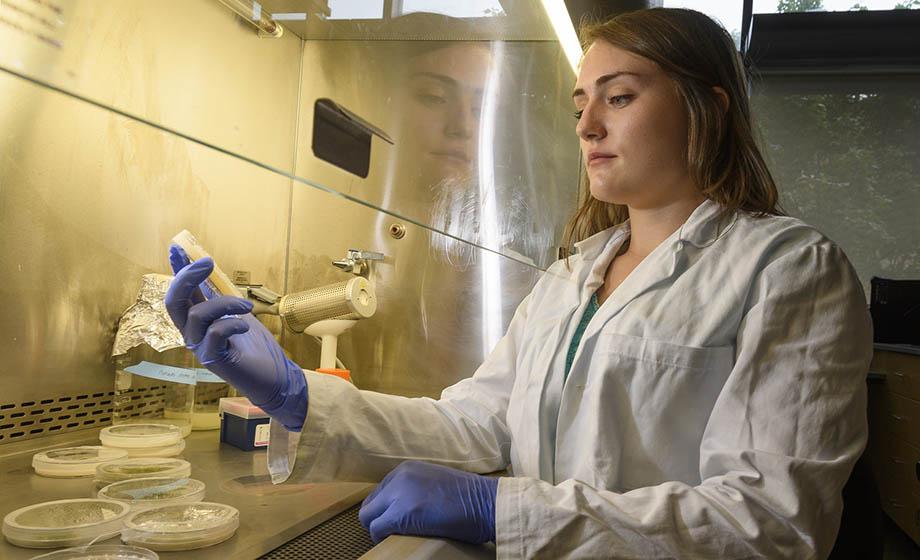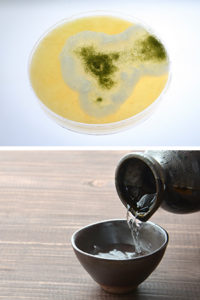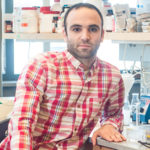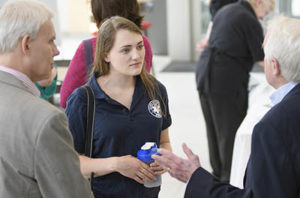
Lucyna Kogut ’18 chose Clark University because “I knew I wanted to be surrounded by people who were passionate about something. It didn’t matter what it was.”
In her first semester here, however, she hadn’t yet identified her passion — and especially never thought it would be science.
“I wasn’t sure what I wanted to do,” she recalls. “I was interested in international development. I was interested in psychology. In high school, I was English and history all the way.”
About Lucyna Kogut ’18
Major: Biology
Concentration: Public Health
Minor: Chemistry
Hometown: Middleboro, Mass.
As part of Clark’s Program of Liberal Studies, which allows students to explore a variety of disciplines while fulfilling course requirements, she took “Introduction to Biology” with professors John Baker and Justin Thackeray.
She was hooked.
John Gibbons, assistant professor of biology, took note of her enthusiasm for exploring — and her intellectual grasp of — complex biological topics, and invited the then-sophomore into his upper-level course on “The Human Genome.” Kogut also received funding through Clark’s Interdisciplinary Summer Research Program to work in Gibbons’ laboratory, which focuses on the structure, function and evolution of genomes.
This summer, Kogut continued working in Gibbons’ lab as part of a prestigious Steinbrecher Fellowship, and she’ll continue to work there her senior year and during her fifth-year accelerated program in biology.

“We’re watching evolution happen, and that’s pretty remarkable,” she says. “We’re watching it, and we’re asking: Is evolution repeatable? Are the changes that we see happening now actually the same mechanisms that previously happened in the wild? We want to be able to track the mutations that occur.”
Kogut’s evolutionary subject is a microbe called Aspergillus flavus, the wild, toxic ancestor of the domesticated Aspergillus oryzae. The domesticated strain is commonly known as koji, a mold used to produce soy sauce, sake, miso and other Asian foods. But the wild strain can lead to cancer and other diseases in humans and can contaminate crops with powerful toxins.
“Roughly 99.5 percent of the Aspergillus flavus genome is shared with the one that is completely fine and has been domesticated — Aspergillus oryzae,” she explains. “What I’m doing is trying to replicate that domestication process that occurred thousands of years ago.”
Ancient artisans noticed that the fuzzy, white stuff (wild Aspergillus flavus) growing on rice produced a sweet alcoholic drink that preserved well. Over thousands of years of use, A. flavus adapted to a starch, rich diet and changed on the genetic level and on the phenotypic level.
At various points during the process of growing Aspergillus flavus, Kogut sequences the genome and records any significant physical changes. She’s hoping to see phenotypes — the characteristics — of the tamer Asperillus oryzae.
“This is a great model for how viruses and other bacteria replicate and evolve so rapidly,” she explains. “We want to better understand the mechanisms within fungi. We’re looking at mutations that knock out those toxic properties. Through the means of selection, I’m trying to knock out production of the toxin that is cancer-causing.”

Once she’s completed her work in the lab, Kogut will turn to the computer to analyze her results by applying bioinformatics, a field that lies at the intersection of computer science and biology. She’s taking bioinformatics classes as well.
“Developing a knowledge of bioinformatics is valuable nowadays because it’s such a new and emerging field,” she says.
Kogut’s genomic research and bioinformatics skills may prove especially useful as she pursues medical school.
“I’m interested in the idea of personalized medicine,” she says. “The idea is: Let’s sequence your genome and come up with personalized treatment plans designed around your cancer and your DNA, to treat you. As far as medicine goes, that’s pretty remarkable, and I’d love to be part of that.”
Besides her work in the Gibbons Lab, Kogut serves as an EMT for both the student-run Clark Rapid Response squad and the Boylston Fire Department ambulance. She’s also a personal trainer, developing individualized fitness plans for clients, and she’s a peer adviser for first-year students.

In addition, Kogut spent a year interning as a youth behavioral health specialist for the Worcester Division of Public Health. She analyzed data from the Regional Youth Health Survey and worked with youth to help them avoid alcohol and substance abuse and risky behaviors. At North High School in Worcester, she started an after-school program for teen girls.“I provided them with education about tobacco, alcohol, stress and anger management, and healthy relationships,” she says. “We talked about these issues and about their experiences, and I served as a sounding board, as someone with maturity and understanding who could provide them with healthy ways for dealing with those issues.”
At Clark, where Kogut discovered her passion for unlocking biological mysteries, she believes multiple experiences have guided her along the path to medical school. She also has appreciated the campus culture that supports her goals.
“After three years here, I’m very happy I chose Clark. Every day, my decision is reaffirmed,” she says. “I like that people aren’t afraid to be themselves. It’s diverse, and there’s no ‘normal’ — everybody has their own thing.”


